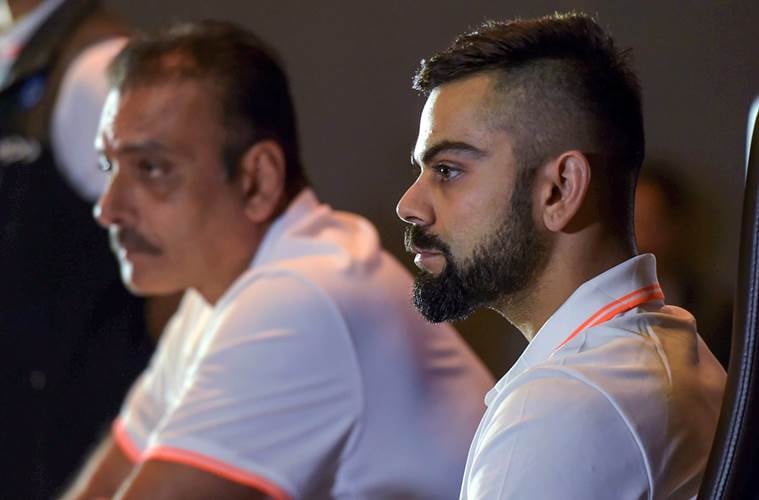 Virat Kohli failed to get a single half-century in the five-Test series against England in 2014 that India lost 1-3. (Source: PTI)
Virat Kohli failed to get a single half-century in the five-Test series against England in 2014 that India lost 1-3. (Source: PTI)
Sporting a new snazzy crew cut, Virat Kohli spoke about fresh beginnings. The insipid IPL season, his neck injury that spoiled his Surrey plans and even the much-publicised past struggles in dealing with swing bowling in England weren’t issues that burdened the Indian captain before the team’s departure for the tour to Ireland and England.
“I think a lot of people have held on to the last tour for far too long. I was asked the same question ahead of the Champions Trophy last year, and my answer was ‘I want to walk on the streets and have coffee’,” Kohli said in jest.
Even England’s free-flowing limited overs batting – earlier this week they scored the highest 50-overs score of 481 – didn’t perturb him. For starters, Kohli attributed the run feat to two factors: flat decks and extra dry English summer. “Pitches (in England) behave differently at different times of the year. This is supposed to be the hottest and driest phases in England,” he explained.
What gave Kohli the confidence to counter England batting was his wrist-spinners: Kuldeep Yadav and Yuzvendra Chahal. “Because of them (Chahal and Yadav), we have actually managed to turn flat tracks into exciting wicket-taking opportunities. I’m really excited to see them bowl in England, because the conditions will not be overtly in their favour, but they have the skill in the wrists. I’m sure other teams are thinking about it. Out of the 50 overs, when you have 20 overs from those two, you know that the opposition team cannot go that far, more so because they know that these two bowlers can get you out in any over. That’s how the mindset changes.”
Kohli admitted that he was not a fan of the two-ball rule in ODIs as it negated reverse swing for fast bowlers, and hence gave bowlers no room to attack. “I have played in ODIs when only one white ball was used, and hence reverse swing was a massive factor. But with two balls in an innings, coupled by flat pitches, there’s hardly any room for attacking cricket, and this is why I feel sorry for the bowlers,” he lamented. The 29-year-old felt that the injury that didn’t allow him to be on the English county circuit was a blessing in disguise. “In hindsight, when I look at it, if I was 90% with my body and was acclimatised to the conditions in England, compared to now when I’m feeling 110% fresh, I would have preferred the latter. This injury has allowed me to freshen up mentally. I had 6-7 sessions in Mumbai, and am raring to go,” he chipped in.
India begin their much-anticipated sojourn with two T20s in Ireland, followed by 3T20s and 3 ODIs in England. They round off the tour with a marathon five-Test series that begins from August 1. India’s last two trips to England (in 2011 and 2014) have been monumental disasters. A calm and visibly fresh Kohli at the could just prove to be the perfect catalyst for India’s turnaround.
Shastri on yo-yo test: You pass, you play, you fail, you sail
India’s head coach Ravi Shastri has countered the criticism about yo-yo tests. “It’s a combination of the two (fitness and talent). If you have the ability, then fitness will only enhance a player’s talents. That is why we emphasise on the Yo-Yo test. Whoever thinks these are one-off hain is sadly mistaken. They can go for a walk. The philosophy is simple: You pass, you play. You fail, you sail. The captain is leading from the front. The selectors and the team management too are on the same page,” he said.
While admitting that his team was in a good frame of mind for the long and arduous three-month sojourn, what pleased Shastri was the well chalked-out itinerary. “I think in terms of preparation, the schedule is ideal. We start with T20s, then play ODIs. By the time the Test series begin, we would have spent more than one month in England. This gives us enough time to acclimatize,” he explained.